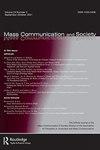事实核查何时有效?16 个欧洲国家纳入错误信息来源和事实核查来源的实验研究
IF 2.7
2区 文学
Q1 COMMUNICATION
引用次数: 0
摘要
尽管学术界越来越关注事实核查,但有关事实核查的几个问题仍未得到解答。首先,目前仍不清楚事实核查在不同政治和医学领域的有效程度。本文章由计算机程序翻译,如有差异,请以英文原文为准。
When are Fact-Checks Effective? An Experimental Study on the Inclusion of the Misinformation Source and the Source of Fact-Checks in 16 European Countries
Despite increasing academic attention, several questions about fact-checking remain unanswered. First, it remains unclear to what extent fact-checks are effective across different political and med...
求助全文
通过发布文献求助,成功后即可免费获取论文全文。
去求助
来源期刊

Mass Communication and Society
COMMUNICATION-
CiteScore
6.90
自引率
3.30%
发文量
58
期刊介绍:
Mass Communication and Society" mission is to publish articles from a wide variety of perspectives and approaches that advance mass communication theory, especially at the societal or macrosocial level. It draws heavily from many other disciplines, including sociology, psychology, anthropology, philosophy, law, and history. Methodologically, journal articles employ qualitative and quantitative methods, survey research, ethnography, laboratory experiments, historical methods, and legal analysis.
 求助内容:
求助内容: 应助结果提醒方式:
应助结果提醒方式:


